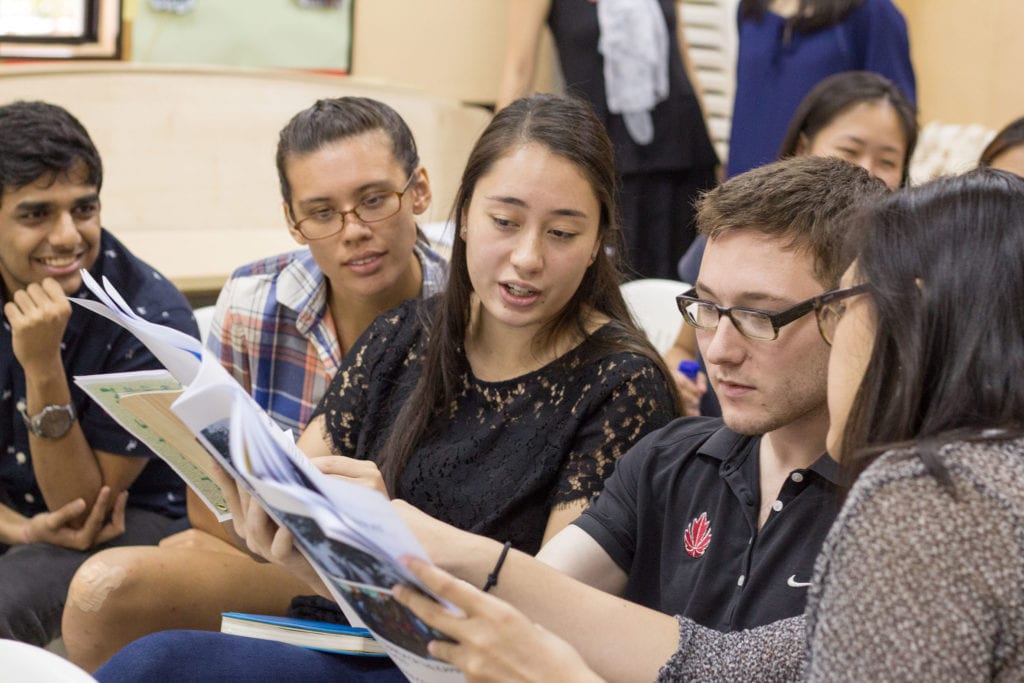Urban Studies Class Explores Community Development in Search of the Kampung Spirit
 Image by Rene Schwietzke via Flickr.
Image by Rene Schwietzke via Flickr.
For the past few months, Lim Se Ern (Class of 2018) has spent time in the Clementi neighbourhood conducting surveys and interviews with the residents there. This was part of a module she was taking called ‘Community Development: In Search of the Kampung Spirit’ taught by Assistant Professor of Social Sciences (Urban Studies) Nick R. Smith.
The module aimed to explore ideas of community and community development, such as questions of what defined a community, whether social capital existed and whether it was beneficial to communities.
According to Dr Smith, the module was an amalgamation of a reading seminar and a practicum. “For two hours each week, students attend a reading seminar focused on developing a better understanding of the concepts of community and community development. In conjunction with that, the class also consists of a practicum, where students apply those concepts in crafting proposals for community development projects in a local community,” he explained.
For Se Ern, who is majoring in Urban Studies, it was a challenging but fulfilling experience. “This parallel has created a situation where we have to think deeply about the processes of investigation and analysis. The biggest challenge in this class so far is to create a project grounded in a local context and to construct a process that is collaborative with the community we’re serving,” she shared.
Students spent the first half of the semester understanding Casa Clementi better through a survey that they developed and administered, followed by qualitative interviews as well as observations and mapping of the neighbourhood.
Another student in the class is Mehul Banka (Class of 2019) who was interested in the class to “see theory put to practice”.
“The in-class discussions have focused a lot on making us self-aware of what we want to achieve through community development and recognise ourselves as stakeholders in the process and they help to inform our fieldwork. However, the hands-on pedagogy is very important to me because it comes down to a more rigorous process where I have to eliminate impractical and ungrounded ideas that otherwise would have been part of class discussions,” he reflected.
For the second half of the semester, students were tasked to develop proposals for community development projects that might be undertaken in the neighbourhood.

From left to right: Students Mehul Banka, Tara Dear, Hannah James, Nik Carverhill and Diamanta Lavi look over the final documents produced by the four project teams. Image by Sara M Watson.
Dr Smith explained that the students were guided through a series of steps to “identify opportunities, brainstorm ideas, and develop strategies and tactics” so as to craft a proposal that would be presented to faculty members as well as members of the grassroots and local community support partners.
The class worked closely with a community partner, Rotary Family Service Centre, which helped the students to build connections with the community. The students also shared their findings and data with the organisation to help them in their work.
The practice-oriented approach that Dr Smith adopted for the class was meant to help equip students with a range of skills they might need in pursuing careers in urban planning, non-profit work, and other sectors.
“This module was really aimed at the seniors in the Urban Studies programme who are preparing to graduate and go out into the real world. It’s designed to help prepare them to make that transition out of the comfortable context of college into a professional context where they will be collaborating in teams and engaging with real problems,” Dr Smith explained.
Dr Smith decided to teach this class partly because of his background in the field of urban planning. He had previously led a Week 7 Learning Across Boundary (LAB) programme to Boston, US, focusing on the idea of open spaces and most recently led 17 students on a LAB titled “Place-Making Lab: Community And Neighbourhood In San Francisco”.
Co-led with Cendana Vice Rector Catherine Sanger, who hailed from San Francisco herself, the LAB focused on practices of community development and issues around neighbourhood change. “We looked at issues such as gentrification in San Francisco, which is a living laboratory for neighbourhood change and one where community development has been robustly practiced,” Dr Smith explained.
On how their lessons learnt could be applied to the community-building project in Yale-NUS College, Se Ern shared that a key takeaway from the class was the ambiguity of the idea itself.
“Community should be something we struggle to define and a term we use cautiously. I hope we at Yale-NUS continue to question the normative assumptions about what a community looks like and remain conscious of our use of this term,” she reflected.
For Mehul, it was realising that “a richer and even stronger community can be built when we each find our individual motivation for immersing in this community.”
Dr Smith also highlighted the advantages of studying other communities through the fieldwork that he leads his students in.
“It can be quite powerful to take engagements with other communities to reflect back on your own community, in our case as a community of learning, and what you can do to develop and strengthen your community,” he noted.
“Ultimately, community is a resource that can erode and disappear if you do not continue to build it, and members of the Yale-NUS community must be conscientious protectors, builders and custodians of our community.”
More recently, Dr Smith also hosted a workshop entitled “Community Planning in China”, which was held on campus on 23-24 June. The workshop brought together 20 scholars from around the world to discuss emergent practices of community development and planning in contemporary China.





